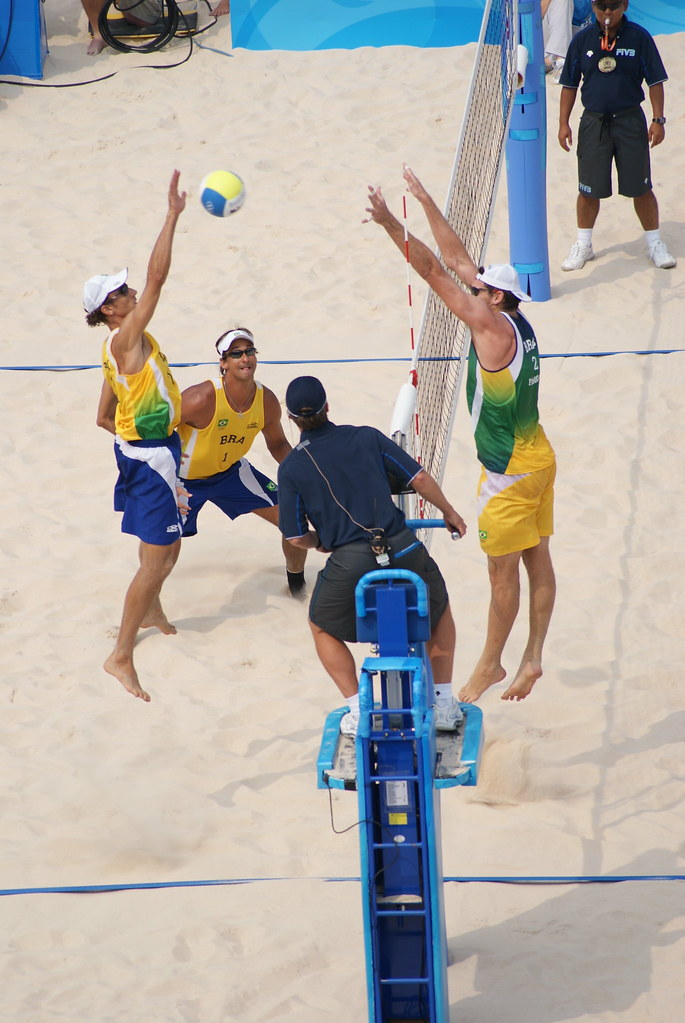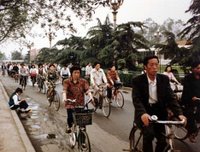Beijing 2008
 I was lucky to get the chance to go to Beijing early this week to see some actions in the Olympics. This was a corporate hospitality program of which I was selected to participate. So I'd like to think it has something to do with the cigar I celebrated last year.
I was lucky to get the chance to go to Beijing early this week to see some actions in the Olympics. This was a corporate hospitality program of which I was selected to participate. So I'd like to think it has something to do with the cigar I celebrated last year.
The visit was only three days short, but the schedule was packed. It started with table tennis on the first day, men's beach volleyball and athletics on the second day, and women's diving on the last day.
I brought along my new Sony Alpha SLR camera, and took a lot of pictures. (Yes, some of them were the cheerleaders from the beach volleyball game.)
Here are some of my observations. Olympic Lane. To anticipate traffic during Olympics, one lane is dedicated as Olympic lane in some streets and highways. Surprisingly (or not?) people are pretty disciplined in keeping this lane only for the Olympic-related vehicles. I was also told that during this period Beijing implements odd-even license plate number to match with the days; that it was quite bad that some offices allow their employees to go to work during the days they can drive. Hey, it's the Olympics after all.
Olympic Lane. To anticipate traffic during Olympics, one lane is dedicated as Olympic lane in some streets and highways. Surprisingly (or not?) people are pretty disciplined in keeping this lane only for the Olympic-related vehicles. I was also told that during this period Beijing implements odd-even license plate number to match with the days; that it was quite bad that some offices allow their employees to go to work during the days they can drive. Hey, it's the Olympics after all. Supporters. When their countries do not play, most supporters will support the better-looking players. At least that's what I observed during the table tennis matches. Tetyana Sorochynska from Ukraine (was playing against Wenling Tan Monfardini from Italy), for example, received full supports from my Indian colleagues.
Supporters. When their countries do not play, most supporters will support the better-looking players. At least that's what I observed during the table tennis matches. Tetyana Sorochynska from Ukraine (was playing against Wenling Tan Monfardini from Italy), for example, received full supports from my Indian colleagues.
Chinese-descendant players. Most table tennis players are Chinese-descendant. Whether they represent France, Italy, Canada, Poland, and more. Men's beach volleyball. My colleagues made fun of me going to see the men's beach volleyball game. Sure, women's beach volleyball would be perfect. But we were definitely entertained by the cheerleaders (the game was of high quality too!) See, men's beach volleyball isn't that bad.
Men's beach volleyball. My colleagues made fun of me going to see the men's beach volleyball game. Sure, women's beach volleyball would be perfect. But we were definitely entertained by the cheerleaders (the game was of high quality too!) See, men's beach volleyball isn't that bad.
Athletics. Usain Bolt was damn fast, and he really looks enjoying every single moment. That's the way it is!
Foreigners. The city is full of foreigners. Most are corporate guests from the main sponsors, and the athletes and coaches themselves, of course. I met a Texan, quite arrogant, who comes with the U.S. soccer team. He doesn't like to sightsee (though I met him near the Forbidden Palace), only to drink and boom-boom.
English. More people in Beijing, I believe, are able to speak English. Some information booths are trilingual. Cops can clearly explain where to get cabs. Servers can even explain that the yummy Peking duck was cooked with pork oil. (damn it!)
I uploaded some of the pictures to my flickr and facebook.














 And a bit closer...
And a bit closer...
